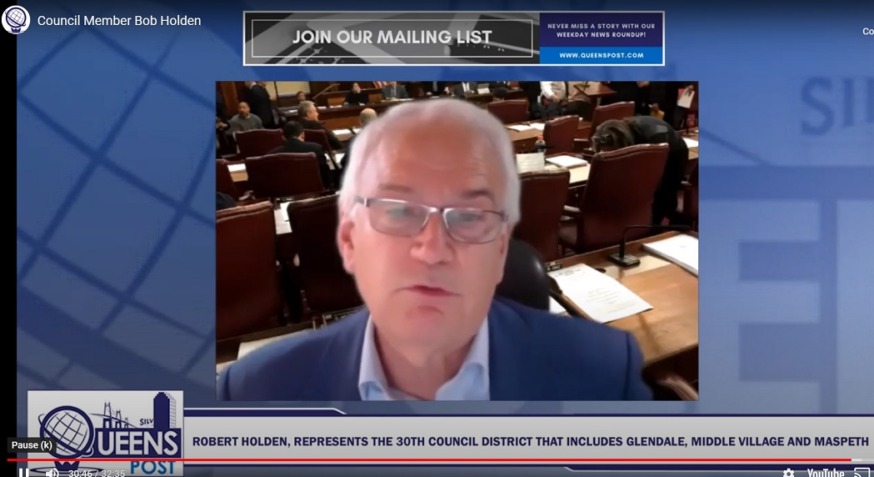
Sept. 7, 2020 By Christian Murray
Council Member Robert Holden, who represents the 30th Council District, considers himself to be a “common sense” elected official—something he says is in short supply among legislators in New York City.
Holden, whose district includes Glendale, Middle Village and Maspeth, says that the progressive and socialist policies of Mayor De Blasio and many in the city council are responsible for putting “the greatest city in the world” at risk of decline.
He talks to the Queens Post and discusses the spike in shootings and murders.
Holden says the “war on police;” progressive bail reform policies; and the “emptying” of the Rikers Island prison facility has put the public at risk.
“We are paying the price for the anti-police protests and the anti-police rhetoric,” Holden says, which has led to the defund and abolish-the-police movement. “My [city council] colleagues are certainly leading the way with the anti-police rhetoric.”
Holden, in the podcast, is critical of some of his council colleagues who argue that the jump in shootings and crime is due to a police slowdown.
“That’s a joke,” Holden, a Democrat, said. “It’s what they have done to the city. We had a great NYPD for decades.”
Holden argues that many dangerous criminals are not doing prison time due to new bail reform laws that were passed by the state last year. Many are now on the streets, he adds.
Holden is especially critical of Mayor Bill de Blasio and his desire to reduce the prison population at Rikers Island, which the council member says has led to more criminals being at large. He also says that the Mayor’s policy to ultimately shut the facility down in favor of borough-based jails is misguided.
“The mayor has done everything wrong with public safety,” Holden says, adding that his desire to reduce the prison population at Rikers as well as the blanket changes being made to the NYPD are the source of the public safety issues.
Holden says that he could never understand the mayor’s fervor to close Rikers Island and the entire “close Rikers movement.”
“It’s not the buildings’ fault things were happening,” he said. “It was management…and that was what needed fixing.”
“There is this religious movement to close Rikers,” Holden said. “Then you had some people come forward in the city council saying you should not build any jails at all….very, crazy radical ideas.”
He said the concept to close Rikers Island and spend billions to construct “skyscraper jails” makes even little sense now given the economic crisis the city now faces. He says rebuild Rikers.
Holden, during the podcast, says the mayor’s policy toward homelessness is also problematic—putting the public at risk.
He says the mayor is in favor of building large dormitory shelters that house a large number of people.
Holden says that the 200-bed, all-male facility that opened in Glendale this year has become a source of problems. He says in the podcast that the men have attacked and robbed random people nearby and even fight among themselves.
He says that building smaller, more manageable “faith based” shelters is a better solution. He said the large facilities—with many people–are just too difficult to manage and are a source of problems. Many people, he said, in these facilities have mental health issues and need to be monitored.
Holden in the podcast talks about the city budget—and the $9 billion hole– and says that many of the mayor’s costly programs need to be cut back.
He says that raising taxes on residents in the five boroughs is not the solution and it would hurt the middle class the most. He says the wealthy have shelters and will find ways to avoid them or move elsewhere.
The council member in the podcast discusses whether he would run for mayor. The New York Post editorial board suggested last month that he would be a good choice.
Holden didn’t dismiss running and said that the next mayor needs to have common sense.
“I’m listening to a lot of people…I would have to convince my wife and that would be a huge task,” he said. “It is flattering.”
One Comment

A lifelong Democrat who lost the primary to Elizabeth Crowley, but then ran on the GOP line and beat her in the general. Please explain.